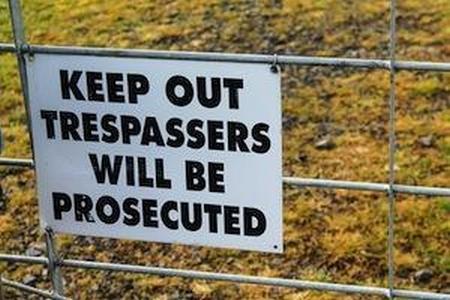Trespassing in Nevada
Contents
- Trespassing in Nevada
- Types of Trespass
- Penalties for Trespassing
- Effective Defenses against Trespassing Charges
- FAQs About Trespassing Nevada
- What constitutes trespassing in Nevada?
- How much is a trespassing fine in Nevada?
- What is considered a threat in Nevada?
- What is the habitual offender law in Nevada?
- What is the three-strike law in Nevada?
- What is habit evidence in Nevada?
- What is the no trespassing law in Nevada?
- How do I press charges in Nevada?
- Is trespassing the same as theft?
- What is the coercion law in Nevada?
- What is the NRS possession of stolen property?
Illegal trespassing can be defined as entering or refusing to leave a place where the owner does not legally invite you in. Although not a felony, trespassing can lead to other charges, some of which may be felonious.
In Nevada, it is absolutely essential to heed the law on trespassing. If you are caught entering someone’s private property without permission, the legal consequences can be severe and life-altering. Consider a group of teenagers looking for an adventure—if they unwittingly step onto someone else’s land, even if their intentions were innocent, they could face serious criminal charges in accordance with NRS 207.200.
Should you find yourself in this position, it is important to take immediate action and contact a criminal defense attorney. While some owners or landlords may be willing to forgive minor transgressions, the penalties for trespassing should not be taken lightly. It is critical to have an experienced legal advocate on your side to protect your rights and minimize the consequences you might face.
Types of Trespass
Trespassing can be a serious offense with both civil and criminal implications. When an individual is accused of trespassing, they may find themselves facing both a criminal charge as well as a civil claim from the landowner or lawful occupant. The state has the authority to lay down criminal charges, whereas the landowner or lawful occupant typically has the right to bring forth civil claims regardless of whether there are criminal charges laid. It is important to note that the burden of proof for civil and criminal trespassing allegations differs slightly.

Trespassing can occur in any number of different ways. The basic requirement is that the person accused did not have permission to be where they were. The following are a few common situations:
- Entering a house or property without permission.
- Entering a house or property when told not to.
- Failing to leave a house or property when told to.
- Returning to a property after you have been asked to leave.
In Nevada, it is not uncommon for out-of-towners to be arrested for trespassing in casinos. In many cases, this is simply due to casino security guards overreacting when someone appears to be loitering or looks suspicious. If you refuse to leave a casino when asked, the police will be called and you may face arrest, even if everything is a misunderstanding. A Las Vegas trespassing attorney can defend you from trespassing charges in court.
This extends to all public areas. Hotels, bars, and restaurants are open to the public, but representatives of these places can revoke your right to be there. If an employee of a venue asks you to leave and you refuse because you have done nothing wrong, you may be charged with trespassing under Nevada law.
Because family and loved ones may be involved, trespassing cases can be emotionally charged. Family members or partners often bar a previous resident from the house or property after a fight. If that person returns or fails to leave when asked, there may be trespassing charges. In addition, a person with a trespassing charge also may face further serious charges such as domestic violence and violation of a restraining order.
Penalties for Trespassing
Trespassing, under Nevada law, is classified as a misdemeanor offense, punishable by a potential jail term of up to six months and/or a fine of up to $1,000.However, because trespassing is a common and nonviolent crime, most judges will not sentence you to jail time unless you are a repeat offender.
If certain aggravating factors are present at the time of the offense, an individual may be charged with additional crimes or more severe offenses:
Trespassing with a Deadly Weapon or Firearm
Carrying a firearm or any other deadly weapon while trespassing can elevate the charges to a class B felony, with much steeper penalties that include longer jail sentences and higher fines.
Trespassing with a Camera
Trespassing for the purpose of taking photos or recording footage using a camera will result in a gross misdemeanor charge, punishable by up to a year in jail and/or a fine of up to $2,000.
Compounding Charges
It’s important to note that trespassing charges often accompany other offenses. As such, it may be possible for an individual to face multiple charges simultaneously, resulting in much more substantial penalties and extremely negative repercussions.
No matter the circumstances, coming in contact with the criminal justice system is never ideal. Even if the fine associated with the conviction is relatively low, the criminal record itself can have serious implications. This includes hindering an individual’s ability to gain employment or secure credit, making it essential to take all necessary steps to avoid committing this offense.
In many cases, people facing trespassing charges accept a plea bargain in order to avoid a trial and get back to their lives. A typical plea bargain will involve a guilty plea, a small fine, and a pledge to avoid arrest and trouble until the fine has been paid. In other cases, you may not have a record or the state’s case may be very weak. In these cases, your Nevada trespass attorney may be able to get the charges dismissed or get the state to drop its case.
Effective Defenses against Trespassing Charges
When facing a trespassing charge, it is important to be aware of the potential defenses available. Depending on the specific circumstances surrounding the incident and the intent of the accused, there are several common defenses that can be employed to challenge a trespassing allegation.
Permission to be on Property
A common defense used to contest the charge of trespassing is the assertion that the accused had permission to be on the property in question. This can include explicit permission from the owner or occupant, either verbal or written, or implied permission such as when an individual enters unlocked land without having been denied access.
Consent from Occupant or Owner
In certain situations, the owner or occupier of a premise may have expressly granted consent for someone to enter their property. In these cases, it may be possible to argue for dismissal of the charges if it can be demonstrated that consent was given prior to entry.
First Amendment Rights
When faced with allegations of trespassing on government-owned land, those exercising their right to free speech may be able to assert a First Amendment defense. The rights protected under the First Amendment do not automatically grant one the right to trespass, but it may still serve as a valid defense in certain cases.
Insufficient Warning
The signage of a vacant property should clearly indicate any restrictions on access. If the warnings presented are not prominent enough, inadequate, or illegible, it may be possible to challenge a trespassing charge due to insufficient warning.
Ultimately, solid evidence and well-articulated arguments are necessary to mount an effective defense against trespassing charges. Understanding which defense best applies to any given situation is important in order to maximize one’s chances of success in challenging such allegations.
FAQs About Trespassing Nevada
What constitutes trespassing in Nevada?
Trespassing is defined under Nevada law as “entering or remaining on any premises without the permission of the owner or other person entitled to possession.” This includes entering into any fenced area or posted land that is intended to keep out intruders. A conviction for trespass can result in a fine of up to $1,000 and/or imprisonment for up to six months.
How much is a trespassing fine in Nevada?
A conviction for trespass in Nevada carries a maximum penalty of a fine of up to $1,000 and/or imprisonment for up to six months.
What is considered a threat in Nevada?
Under Nevada law, a threat is defined as an oral expression, gesture or writing that conveys an intent to injure or cause fear of injury to any person or property. A conviction for making a threat can result in a fine of up to $10,000 and/or imprisonment for up to five years.
What is the habitual offender law in Nevada?
The Nevada habitual offender law states that a person can be charged with a felony if they have been convicted twice within seven years of certain criminal acts including burglary, robbery or attempted murder. If convicted, the individual may face more severe penalties than they would have facing just one charge.
What is the three-strike law in Nevada?
The three-strike law allows for harsher sentences for individuals who have been convicted of three or more serious felonies. Those convicted of their third offense are subject to life imprisonment with no possibility of parole.
What is habit evidence in Nevada?
In Nevada, habit evidence refers to testimony provided by witnesses that attests to the fact that a person has engaged in particular patterns of behavior in the past and that they are likely to do so again. This type of evidence is most often used in cases involving violent or repeat offenders.
What is the no trespassing law in Nevada?
The no trespassing law in Nevada prohibits individuals from entering onto private property without the express permission of the owner or someone authorized to give permission. If a person does trespass on private property without permission, they can be found liable for fines and even imprisonment.
How do I press charges in Nevada?
To press charges in Nevada, you must first file a police report and then contact the local District Attorney’s office. The district attorney will then decide whether or not to prosecute the alleged offender based on the evidence presented.
Is trespassing the same as theft?
No, trespassing is not the same as theft. Trespassing occurs when an individual enters another’s property without permission whereas theft involves taking something that does not belong to you without consent.
What is the coercion law in Nevada?
The coercion law in Nevada criminalizes any act whereby a person forces another individual through threat of harm or injury to do something against their will. Conviction for this crime can result in hefty fines or even imprisonment.
What is the NRS possession of stolen property?
NRS 205.275 prohibits the possession, disposal, or transfer of stolen property with the knowledge that it was stolen or with reckless disregard of the fact that it was stolen. If convicted, one can face disciplinary action, including jail time and/or monetary fines.




I recently came across a case of illegal trespassing in Nevada that had some interesting legal implications. A group of hikers decided to explore an abandoned mining site in a remote area of the state. The site was clearly marked with “No Trespassing” signs, but the hikers ignored them and proceeded to enter the property.
Unbeknownst to the hikers, the mining site was still owned by a private company, even though it had been inactive for many years. The company had not properly secured the site, assuming that its remote location would deter any trespassers. However, they were alerted to the hikers’ presence by a security camera installed at the entrance.
The company immediately contacted local law enforcement, who arrived at the scene and apprehended the hikers. They were charged with illegal trespassing, a misdemeanor offense in Nevada. The hikers argued that they were not aware of the ownership status of the property and believed it to be abandoned.
During the trial, the company